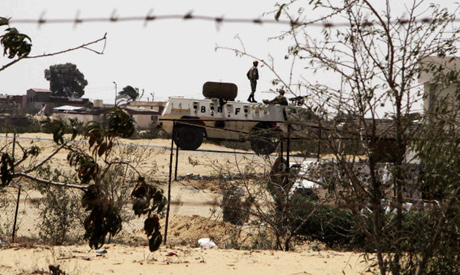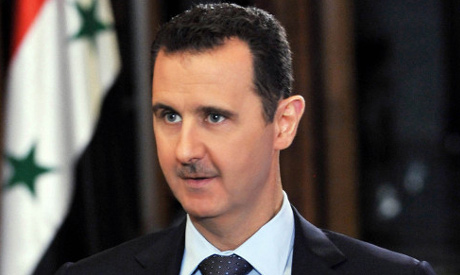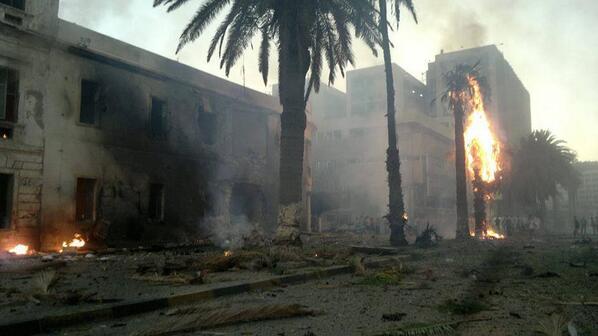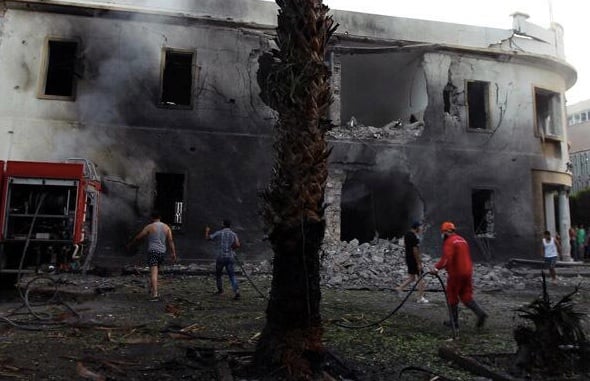Libya terrorists remind the US what US policies have wrought in Libya !



Egypt.......






 Eleven people were killed on Wednesday morning in a double suicide car bomb attack at a military intelligence headquarters and a nearby military checkpoint in the northern Sinai town of Rafah, state news agency MENA reported. The death toll includes at least 6 military personnel and two suicide bombers.
Eleven people were killed on Wednesday morning in a double suicide car bomb attack at a military intelligence headquarters and a nearby military checkpoint in the northern Sinai town of Rafah, state news agency MENA reported. The death toll includes at least 6 military personnel and two suicide bombers.
AP






 Syria's President Bashar al-Assad marks his 48th birthday on Wednesday with the threat of US-led strikes against his regime in response to an alleged chemical weapons attack apparently receding.
Syria's President Bashar al-Assad marks his 48th birthday on Wednesday with the threat of US-led strikes against his regime in response to an alleged chemical weapons attack apparently receding.
Blast strikes Benghazi 1 year after US consulate bombing

Libyan firefighters work outside a foreign ministry building following a powerful blast on September 11, 2013 in the eastern Libyan city of Benghazi. (AFP Photo/Abdullah Doma)
A bomb explosion has caused serious damage to the Foreign Ministry building in the Libyan city of Benghazi. It comes on the anniversary of the attack on the US consulate in that city which killed the ambassador and three aides.
Witnesses say that the explosion was caused by a car bomb and it is not yet clear if there are any casualties. Photographs of the wreckage show a large section of the Foreign Ministry has been destroyed as well as parts of the nearby local headquarters of the central bank.
Another photo of the explosion on the Foreign Affairs ministry in #Benghazi #Libya ( While trees Burns ) pic.twitter.com/iCTgjcKSIt
The US diplomatic compound in Benghazi was attacked on September 11 last year by a group of heavily armed militants. The early morning attack left four Americans dead, including US Ambassador J. Christopher Stevens. Following the incident Washington strongly condemned the attack and attributed it to anti-Western protests in the region.
Washington later reevaluated its assessment of the situation, stating that the attack was most likely planned in advance by Al-Qaeda-affiliated militants.
Since last September’s attack, outbreaks of violence have become more commonplace in Libya, as tensions rise between the population and the militia groups left behind after assisting in the ouster of Colonel Gaddafi in 2011.
Libya’s interim government has failed to bring the country’s militia groups under control over two years after Gaddafi;s removal. The militia groups are often heavily armed and enforce their authority in the rural communities where they have entrenched themselves.
Washington later reevaluated its assessment of the situation, stating that the attack was most likely planned in advance by Al-Qaeda-affiliated militants.
Since last September’s attack, outbreaks of violence have become more commonplace in Libya, as tensions rise between the population and the militia groups left behind after assisting in the ouster of Colonel Gaddafi in 2011.
Libya’s interim government has failed to bring the country’s militia groups under control over two years after Gaddafi;s removal. The militia groups are often heavily armed and enforce their authority in the rural communities where they have entrenched themselves.
Libyan Foreign Minister Mohamed Abdulaziz told RT’s Arabic channel Rossiya al-Yaum that security is of paramount importance to Libya’s National Congress.
“It is extremely important that the government and the National Congress are capable of responding to the type of challenges we have at the moment,” said Abdulaziz, stressing it is necessary to sure up the Libyan police service to enforce government authority.

Libyans gather outside a foreign ministry building that was damaged by a powerful blast on September 11, 2013 in the eastern Libyan city of Benghazi. (AFP Photo/Abdullah Doma)

Libyans gather outside a foreign ministry building that was damaged by a powerful blast on September 11, 2013 in the eastern Libyan city of Benghazi. (AFP Photo/Abdullah Doma)
Massive car-bomb explodes in downtown Benghazi
Tripoli, 11 September 2013:
A massive car-bomb exploded outside the Benghazi branch of the Ministry of Foreign Affairs this morning, causing major structural damage to the building.
Two security guards stationed outside the nearby Central Bank of Libya (CBL) suffered minor injuries in the blast, which happened in the early hours of the morning.
“It was a massive explosion which caused a lot of damage to the two buildings,” spokesman for Benghazi’s Joint Security Room Abdullah Zaidi told the Libya Herald. Windows of nearby buildings, including those of CBL shattered in the blast.
The Benghazi Joint Security Forces were now trying to check video footage from CBL cameras, Zaidi said. He added that the Ministry of Foreign Affairs was not fitted with cameras.
The explosion has fallen on the anniversary of the 2011 terrorist attacks in the US, which last year saw US ambassador to Libya Chris Stephens killed. It is not known if the date is significant to today’s incident. However, a group calling itself the Islamic Emirate of Libya apparently posted a notice on its facebook page threatening attacks on various institutions across the country.
Today in Egypt there was a car-bomb attack on the Sinai intelligence forces that left three soldiers dead and some 20 people with injuries. This suggests that militants have been trying to make a bloody statement today.
UPDATE 1: Eleven killed in twin bomb attack on Egyptian military in Sinai
Double suicide attack on military intelligence headquarters and army checkpoint in North Sinai town of Rafah kills eleven, injures 17, including civilians
Ahram Online, MENA, Wednesday 11 Sep 2013

File Photo: Egyptian border guards patrol near the border with Israel in Rafah (Photo: AP)
Related
Ten solidiers and seven civilians were also wounded in the "treacherous blast targeting security forces," army spokesperson Ahmed Ali said.
After the initial blast, which shattered the main gate of the military facility and ripped through parts of its railings, unknown assailants fired rocket-propelled grenades at the building, state TV said.
A second suicide car bomb hit a nearby army checkpoint minutes after the first attack.
Egypt's border crossing with the Gaza Strip was shut in the immediate aftermath of the attack as the armed forces combed the area for suspects, MENA reported.
The Rafah crossing is the only gateway into the impoverished Palestinian enclave which is blockaded by Israel.
Egypt's military has launched a broad offensive against Islamist militants after an uptick in violence following the overthrow of Islamist president Mohamed Morsi on 3 July. The army has so far killed around 100 militants.
The attacks come just days after an Al-Qaeda-inspired group in the peninsula claimed responsibility for a Cairo bombing that targeted the interior minister.
Rafah adjoins Israel and the Gaza Strip.
Suicide bombs hit Egypt military in Sinai, kill 6
Alzheimer's Treatment - NJ's Alzheimer's Disease Center - Leaders in Treatment and Preventionbarnabashealth.org
A pair of suicide bombers rammed their explosives—laden cars into military targets in Egypt’s volatile Sinai on Wednesday, killing at least six soldiers and wounding 17 people, security officials and a military spokesman said.
One of the two bombings in the town of Rafah brought down a two—story building housing the local branch of military intelligence, while the other struck an army checkpoint.
The near—simultaneous attacks nudged the violence in the strategic Sinai Peninsula closer to a full—blown insurgency, compounding Egypt’s woes at a time when the country is struggling to regain political stability and economic viability more than two years since longtime autocrat Hosni Mubarak was toppled in a popular uprising.
The attacks also came less than a week after a suicide car bombing targeted the convoy of Egypt’s interior minister, who is in charge of the police, shortly after he left his home in an eastern Cairo district. Mohammed Ibrahim, the minister, escaped unharmed, but the blast caused extensive damage in the area. An al—Qaida—inspired group based in Sinai claimed responsibility for that bombing.
Wednesday’s attack on the intelligence building in Rafah collapsed the entire structure and buried an unspecified number of troops under the rubble, two security officials said, speaking on condition of anonymity because they were not authorized to talk to the media.
The second attack targeted an armored personnel carrier deployed as part of an army checkpoint not far from the intelligence headquarters, the officials added. The officials said the remains of the two suicide bombers have been recovered.
Chief military spokesman, Col. Ahmed Mohammed Ali, said the attacks killed six soldiers and wounded 17 people 10 soldiers and seven civilians, including three women. The security officials said the blast at the intelligence building also badly damaged five houses nearby.
Egypt’s official MENA news agency later reported that following the attacks, authorities ordered the closure of the Rafah border crossing, which links Egypt to the Gaza Strip.
There was no immediate claim of responsibility for Wednesday’s attack.
Militants in Sinai, some with links to al—Qaida, have been targeting for months Egyptian forces in the strategic peninsula bordering Gaza and Israel. Their attacks have become much more frequent and deadlier since the ouster this summer of Mohammed Morsi, Egypt’s Islamist president. After Mubarak’s ouster, Morsi became the country’s first democratically elected president in 2012 but he was deposed in July by the military after days of massive street protests against him.
Earlier this week, the Egyptian military launched a major offensive against the militants in the northern region of Sinai.
Officials have described the offensive, which started on Saturday, as the biggest sweep of the area in recent years, aiming to weed out al—Qaida—inspired groups that have taken control of villages in northern Sinai.
Five days of military operations so far have left 29 Islamic militants dead and the military has boasted of capturing weapons caches, missile launchers, and dozens of vehicles and fuel storage sites. Some 30 militants were arrested during raids mostly low—level operatives.
One officer and two soldiers have also been killed in the operation since Saturday.
On Monday, Egypt’s state news agency MENA cited unnamed senior security officials as saying at least six militant groups with an estimated 5,000 members operate in Sinai. The militants use mountains in north and central Sinai as hideouts, where the rugged terrain is difficult to search.
But the repeated security operations have increased tension with local residents, who accuse authorities of randomly targeting homes and arresting innocent people.
Syria .....
Syria's Assad marks birthday as strike threat recedes
Bashar Al-Assad had surprisingly risen to power in 2000 following the death of ex-president Hafez Al-Assad, his father
AFP , Wednesday 11 Sep 2013

Syrian President Bashar Assad listens during an interview with PBS host Charlie Rose, not pictured, at the presidential palace in Damascus, Syria, Sunday, Sept. 8, 2013 (Photo: AP)
Related
A Syrian pro-regime site called on residents of the capital Damascus to demonstrate their support for Assad by joining a convoy of cars in the Mazzeh district to honour him.
Assad, a British-trained ophthalmologist who has three children, succeeded his father Hafez, who died in 2000.
He came to the position of heir unexpectedly, after his brother Bassel was killed in a car accident.
Once considered a potential reformer, who discussed the need for political and economic openness after he took office, Assad has responded with an iron fist to an uprising that began in March 2011.
More than 110,000 people have been killed in the violence that erupted after his forces cracked down on demonstrators calling for his ouster, according to the Syrian Observatory for Human Rights.
He marks his birthday as the threat of imminent US-led strikes against his regime appears to have waned.
The strikes, which were intended to punish the regime for allegedly using chemical weapons on August 21, appear to be on hold as a Russian proposal that Syria hand over its chemical weapons is discussed.
Inside Syria, Assad is believed to have a firm grip on his regime, more than two years after the uprising began.
"He is even more the 'boss' than before, even if he can't act without the support of the military and security apparatus," according Nikolaos van Dam, a Dutch diplomat and author of a book on Syria.
"He listens to his advisors, but he takes the decision by himself," adds an expert based in Beirut.
Assad's confidantes include his brother Maher al-Assad, a colonel who heads the division in charge of Damascus, as well as his wife Asma.
His inner circle also includes his uncle and cousin Mohammed and Rami Makhlouf, two businessmen, and Hafez Makhlouf, his security chief in Damascus.
Most of his inner circle, like Assad, hails from the Alawite minority, although his wife Asma is a Sunni Muslim.
But he also counts Druze among his closest advisors, including minister of presidential affairs Mansour Azzam and Louna al-Shibi, a former journalist.
Others close to him include Alawite Hussam Sukkar, a general and his presidential security advisor, and two senior Sunni intelligence officials -- General Ali Mamluk, who heads national security, and General Rustom Ghazaleh, head of political security.



No comments:
Post a Comment